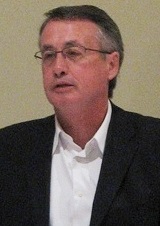Wayne Swan
[1] In 2011, Swan was named Finance Minister of the Year by Euromoney magazine, joining Paul Keating as the only Australian Treasurer to have been awarded that title.
Swan won a Commonwealth scholarship to study Public Administration at the University of Queensland, where he resided at Emmanuel College and graduated with a Bachelor of Arts.
During the 2003 Labor leadership spills he was a prominent supporter of Kim Beazley, but retained his position in the Shadow Cabinet when Mark Latham became the new leader.
It was believed that strong opposition from Labor's Right Faction had put Latham under pressure to appoint either Swan or Shadow Industrial Relations Minister Stephen Smith to the position.
After Kevin Rudd successfully challenged Kim Beazley to win the leadership of the Labor Party in December 2006, he reappointed Swan as Shadow Treasurer.
[16] Swan's first budget concentrated on inflationary pressures in the economy, with substantially reduced spending that exceeded the A$11 billion outlaid for tax cuts.
The policy debate shifted around August 2008 after mortgage lending banks in the United States began to collapse and economic activity faltered as American investments were written off.
When the December quarterly growth report showed the economy contracting, he moved ahead with the Nation Building and Jobs Plan to provide government-sponsored work worth A$42 billion.
On 20 September 2011, Swan was named Finance Minister of the Year by Euromoney magazine, joining Paul Keating as the only Australian Treasurer to have been conferred that title.
[21] and a subsequent address to the National Press Club,[22] In The Monthly essay he opined: The latest example of this is the foray by Australia’s richest person, Gina Rinehart, into Fairfax Media, reportedly in an attempt to wield greater influence on public opinion and further her commercial interests at a time when the overwhelming economic consensus is that it's critical to use the economic weight of the resources boom to strengthen the entire economy.Politicians have a choice: between exploiting divisions by promoting fear and appealing to the sense of fairness and decency that is the foundation of our middle-class society; between standing up for workers and kneeling down at the feet of the Gina Rineharts and the Clive Palmers.For every Andrew Forrest who wails about high company taxes and then admits to not paying any, there are a hundred Australian businesspeople who held on to their employees and worked with government to keep the doors of Australian business open during the GFC.
The vast majority of our miners accept that they have a social obligation to pay their fair share of tax on the resources Australians own.On 23 June 2010, Deputy Prime Minister Julia Gillard challenged Kevin Rudd for the leadership of the Labor Party.
A substantial part of the collection relates to the Global Financial Crisis of 2008–2009 and is highly significant given that Australia was a key contributor to G20 discussions.
According to Guardian political editor Katharine Murphy, he "prevailed in a contest where the left faction normally dominates by appealing to progressive rank-and-file ALP members courtesy of his relentless campaigning on inequality".
Swan was subsequently called to give testimony on the matter before the Senate Economics Committee, during which he publicly apologised for the delays in payments of claims.





